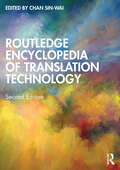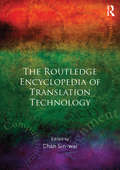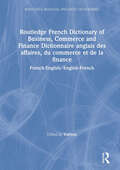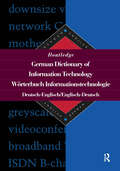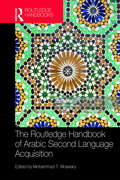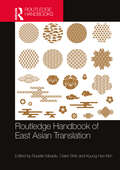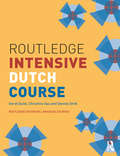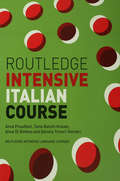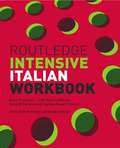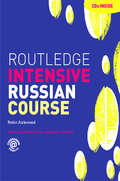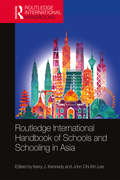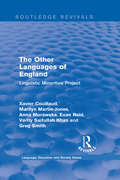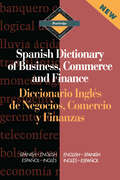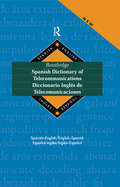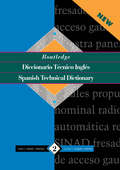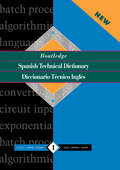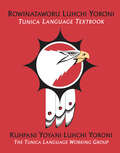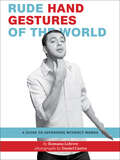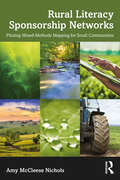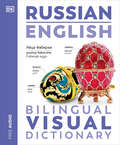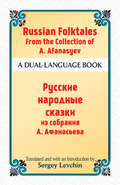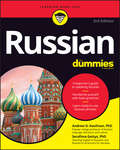- Table View
- List View
Routledge Encyclopedia of Translation Technology
by Chan Sin-WaiRoutledge Encyclopedia of Translation Technology, second edition, provides a state-of-the-art survey of the field of computer-assisted translation. It is the first definitive reference to provide a comprehensive overview of the general, regional, and topical aspects of this increasingly significant area of study. The Encyclopedia is divided into three parts: Part 1 presents general issues in translation technology, such as its history and development, translator training, and various aspects of machine translation, including a valuable case study of its teaching at a major university; Part 2 discusses national and regional developments in translation technology, offering contributions covering the crucial territories of China, Canada, France, Hong Kong, Japan, South Africa, Taiwan, the Netherlands and Belgium, the United Kingdom, and the United States; Part 3 evaluates specific matters in translation technology, with entries focused on subjects such as alignment, concordancing, localization, online translation, and translation memory. The new edition has five additional chapters, with many chapters updated and revised, drawing on the expertise of over 50 contributors from around the world and an international panel of consultant editors to provide a selection of chapters on the most pertinent topics in the discipline. All the chapters are self-contained, extensively cross-referenced, and include useful and up-to-date references and information for further reading. It will be an invaluable reference work for anyone with a professional or academic interest in the subject.
Routledge Encyclopedia of Translation Technology
by Chan Sin-WaiRoutledge Encyclopedia of Translation Technology, second edition, provides a state-of-the-art survey of the field of computer-assisted translation. It is the first definitive reference to provide a comprehensive overview of the general, regional, and topical aspects of this increasingly significant area of study. The Encyclopedia is divided into three parts: Part 1 presents general issues in translation technology, such as its history and development, translator training, and various aspects of machine translation, including a valuable case study of its teaching at a major university; Part 2 discusses national and regional developments in translation technology, offering contributions covering the crucial territories of China, Canada, France, Hong Kong, Japan, South Africa, Taiwan, the Netherlands and Belgium, the United Kingdom, and the United States; Part 3 evaluates specific matters in translation technology, with entries focused on subjects such as alignment, concordancing, localization, online translation, and translation memory. The new edition has five additional chapters, with many chapters updated and revised, drawing on the expertise of over 50 contributors from around the world and an international panel of consultant editors to provide a selection of chapters on the most pertinent topics in the discipline. All the chapters are self-contained, extensively cross-referenced, and include useful and up-to-date references and information for further reading. It will be an invaluable reference work for anyone with a professional or academic interest in the subject.
Routledge Encyclopedia of Translation Technology
by Sin-Wai ChanThe Routledge Encyclopedia of Translation Technology provides a state-of-the art survey of the field of computer-assisted translation. It is the first definitive reference to provide a comprehensive overview of the general, regional and topical aspects of this increasingly significant area of study. The Encyclopedia is divided into three parts: Part One presents general issues in translation technology, such as its history and development, translator training and various aspects of machine translation, including a valuable case study of its teaching at a major university; Part Two discusses national and regional developments in translation technology, offering contributions covering the crucial territories of China, Canada, France, Hong Kong, Japan, South Africa, Taiwan, the Netherlands and Belgium, the United Kingdom and the United States Part Three evaluates specific matters in translation technology, with entries focused on subjects such as alignment, bitext, computational lexicography, corpus, editing, online translation, subtitling and technology and translation management systems. The Routledge Encyclopedia of Translation Technology draws on the expertise of over fifty contributors from around the world and an international panel of consultant editors to provide a selection of articles on the most pertinent topics in the discipline. All the articles are self-contained, extensively cross-referenced, and include useful and up-to-date references and information for further reading. It will be an invaluable reference work for anyone with a professional or academic interest in the subject.
Routledge French Dictionary of Business, Commerce and Finance Dictionnaire anglais des affaires, du commerce et de la finance: French-English/English-French (Routledge Bilingual Specialist Dictionaries)
by VariousThis dictionary consists of some 100,000 terms and references in bith French and English, including 4,000 abbreviations. over 45 subject areas are covered, including: * Accountancy * Banking * Business Administration * Computing * Economics * Environment * Finance * General Commerce * Human Resource Management * Import/Export * Industry * Insurance * Law * Leisure * Management * Mathematics * Media * Patents * Politics * Property * Sales & Marketing * Stock Market * Taxation * Tourism * Transport * Welfare & Safety. Also included is a comprehensive up-to-date reference section on countries, business correspondence and situations, job titles, stock exchanges, economic indexes and numbers.KEY FEATURESTerm Specialists - the terms list has been checked by over 100 sources including experts from Apple France * Association Française des Banques * Chartered Institute of Banking * France Telecom * Institute of European Trade and Technology * American Graduate School of Management * London School of Economics * Ecole supérieure de commerce de Lyon * Department of Trade and Industry * Law Society * University of Reading * Environment Council * University of Bath * Centre de Recherche et de Gestion * Manchester Business School * Ecole supérieure internationale de commerce and Ecole des hautes études commerciales de Montrial(HEC).Prestigous experts - include Prof. Chris Nobes, Prof. Michel Péron, Prof. Gordon Shenton, Dr. Van de Yeught and Prof. Peter Walton.Native Speakers - all stages of compilation have included native speakers of French as well as English and extensive coverage of US as well as UK terminology.
Routledge German Dictionary of Information Technology Worterbuch Informationstechnologie: German-English/English-German (Routledge Bilingual Specialist Dictionaries)
by Sinda LópezThis thorough reference source is in-dispensible for translators working in the realms of artificial intelligence, computing, data processing, physics, online services and related disciplines. The dictionary also features hot translation links, indexed cross-references for easy, rapid access, and an intuitive screen environment while covering the most up-to-date terminology in this cutting edge subject area. Diese umfassende Referenzquelle ist für Übersetzer, die in den Bereichen künstliche Intelligenz, Informatik, Datenverarbeitung, Physik, Online-Dienste und verwandten Disziplinen arbeiten, unverzichtbar. Das Wörterbuch verfügt außerdem über „Hot Translation“-Links, indizierte Querverweise für einen einfachen und schnellen Zugriff sowie eine intuitive Bildschirmumgebung und deckt gleichzeitig die aktuellste Terminologie in diesem hochmodernen Themenbereich ab.
Routledge Handbook of Arabic Second Language Acquisition (Routledge Language Handbooks)
by Mohammad T. AlhawaryThe Routledge Handbook of Arabic Second Language Acquisition introduces major current approaches in Arabic second language acquisition (SLA) research and offers empirical findings on crucial aspects and issues to do with the learning of Arabic as a foreign language and Arabic SLA. It brings together leading academics in the field to synthesize existing research and develops a new framework for analyzing important topics within Arabic SLA. This handbook will be suitable as a reference work for advanced undergraduate and postgraduate students and scholars actively researching in this area and is primarily relevant to sister disciplines within teacher training and Arabic applied linguistics. The themes and findings should, however, also be attractive to other areas of study, including theoretical linguistics, psycholinguistics, cognition, and cognitive psychology.
Routledge Handbook of East Asian Translation (Routledge Studies in East Asian Translation)
by Kyung Hye Kim Ruselle Meade Claire ShihRoutledge Handbook of East Asian Translation showcases new research and developments in translation studies within the East Asian context.This handbook draws attention to the diversity of scholarship on translation in East Asia, and its relevance to a variety of established and emerging fields. It focuses on hitherto less-explored interactions, such as intra-Asian translation encounters, translation of minority languages, and translation between East Asian and non-European languages, while also contributing to a thriving body of historical scholarship on East Asian translation traditions. Contributions reflect a growing awareness of the cultural and linguistic heterogeneity within nations, and the reality of multilingualism and plurilingualism among many communities in East Asia. A wide variety of translatorial practices are discussed, including the creative use of Chinese in Japanese-language novels, the use of translation to evade censorship online, community theatre translation, and translation of picture books. The volume also includes contributions by practitioners, who reflect on their experiences of translation and of developing training programmes for community interpreters.This handbook will appeal to researchers and students of translation and interpreting studies. Chapters are likely to be of value to those working, not only in East Asian studies, but also disciplines such as literary studies, global cultural studies, and LGBT+ studies.
Routledge Intensive Dutch Course (Routledge Intensive Language Courses)
by Christine Sas Gerdi Quist Dennis StrikThis intensive foundation course in Dutch is designed for those with no previous knowledge of the language. It is lively and fast-paced, providing students with a wide range of activities, and drawing on an impressive selection of source material from many different media. Audio materials are presented on accompanying CDs, to be purchased separately. Taking students from beginner to intermediate level in one year, the Routledge Intensive Dutch Course develops a thorough working knowledge of the structures of Dutch and practises the four key skills of language learning: reading, writing, speaking, and listening. Guidance for tutors as well as links to related sites is available on the Routledge website.
Routledge Intensive Italian Course (Routledge Intensive Language Courses)
by Anna Proudfoot Tania Batelli Kneale Daniela Treveri Gennari Anna Di StefanoThis intensive foundation course in Italian is designed for students with no previous knowledge of the language. Accompanying audio material containing dialogues, listening exercises and pronunciation practice is available to listen to here www.routledge.com/9780415240802. The audio is designed to work alongside the accompanying book. Students using the Routledge Intensive Italian Course will practise the four key skills of language learning - reading, writing, speaking, and listening - and will acquire a thorough working knowledge of the structures of Italian. The Routledge Intensive Italian Course takes students from beginner to intermediate level in one year.
Routledge Intensive Italian Workbook (Routledge Intensive Language Courses)
by Anna Proudfoot Tania Batelli Kneale Daniela Treveri Gennari Anna Di StefanoThe Routledge Intensive Italian Workbook is a comprehensive book of exercises and tasks for beginner and intermediate learners of Italian.It includes a wide variety of exercises - covering a broad range of situations and functions - and will help students to progress rapidly and master the language accurately. Students can check their own progress using the answer key. The Workbook can be used independently, or in conjunction with the Routledge Intensive Italian Course, an accelerated course in Italian for adult beginners, which is accompanied by audio material.
Routledge Intensive Russian Course (Routledge Intensive Language Courses)
by Robin AizlewoodThis intensive foundation course in Russian is designed for students with no previous knowledge of the language. Developed primarily for classroom use, the course offers an original and distinctive approach to language learning, presenting Russian in context offering access to Russian life, culture, history and society. Using authentic language throughout, the course takes students from beginner to intermediate level in one year. Progress is carefully structured, starting with simple grammar and working towards more complex points with the acquisition of a significant body of vocabulary. By the end of the course students will have acquired a sound knowledge of the main structures of the language and will be able to express themselves confidently in a wide range of communicative contexts. The tried-and-tested material featured in the course is structured to improve all four core skills of language learning: speaking, listening, reading and writing. The course is divided in three parts: Part 1 provides a foundation which gets the student going in Russian Part 2 concentrates on intensive development to take the student rapidly forward Part 3 incorporates both revision and further development. Each unit is divided into lessons which all include lively dialogues, sections on grammar and language functions and lots of exercises that help develop the student's practical language skills. Audio materials recorded by native speakers include dialogues, exercises and a variety of texts to help students using the course to improve their listening comprehension and pronunciation skills. Audio materials recorded by native speakers include dialogues, exercises and a variety of texts to help students using the course to improve their listening comprehension and pronunciation skills. The audio materials and other supplementary materials are available as free eResources here: www.routledge.com/9780415223003.
Routledge International Handbook of Schools and Schooling in Asia (Routledge International Handbooks)
by John Chi-Kin Lee Kerry J. KennedyThis comprehensive handbook is the ultimate reference work, providing authoritative and international overviews of all aspects of schools and schooling in Asia. Split into 19 sections it covers curriculum, learning and assessment, private supplementary tutoring, special education, gender issues, ethnic minority education and LGBTQI students in Asian schools. The volume displays the current state of the scholarship for schools and schooling in Asia including emerging, controversial and cutting-edge contributions using a thematic approach. The content offers a broad sweep of the region with a focus on theoretical, cultural and political issues as well as identifying educational issues and priorities, such as curriculum, assessment, teacher education, school leadership, etc., all of which impact students and learning in multiple ways. The Routledge International Handbook of Schools and Schooling in Asia brings together experts in each area to contribute their knowledge, providing a multidimensional and rich view of the issues confronting the region’s school and education systems.
Routledge Revivals: Linguistic Minorities Project (Routledge Revivals: Language, Education and Society Series #2)
by Greg Smith Xavier Couillaud Marilyn Martin-Jones Anna Morawska Euan Reid Verity Saifullah KhanThe ‘other’ languages of England — those which originate in South and East Asia, and Southern and Eastern Europe — are now important parts of everyday life in urban England. First published in 1985, this book gives detailed information about which languages are in widespread use among children and adults, patterns of language use in different social contexts, the teaching of these community languages inside and outside of mainstream schools, and the educational implications of this linguistic diversity for all children in England. They authors argue that this continued and widespread bilingualism is a valuable potential resource for both the speakers and society as a whole.
Routledge Spanish Dictionary of Business, Commerce and Finance Diccionario Ingles de Negocios, Comercio y Finanzas: Spanish-English/English-Spanish (Routledge Bilingual Specialist Dictionaries)
by Emilio G. CastroThis Dictionary consists of some 100,000 terms in both Spanish and English, drawn from the whole range of business, finance and banking terminology. Over 45 subject areas are covered, compiled by a team of international terminologists
Routledge Spanish Dictionary of Telecommunications Diccionario Ingles de Telecomunicaciones: Spanish-English/English-Spanish (Routledge Bilingual Specialist Dictionaries)
by Emilio G. CastroThis dictionary consists of some 25,000 terms and references in both Spanish and English, drawn from all the major areas in the field of Telecommunications. It includes comprehensive labelling of subject areas, detailed abbreviation entries including cross-reference links to full forms, full British and American English coverage of lexical and spelling variants presented in clear layout and typography. Este diccionario consta de unos 25.000 términos y referencias tanto en español como en inglés, procedentes de las principales áreas del campo de las Telecomunicaciones. Incluye etiquetado completo de áreas temáticas, entradas de abreviaturas detalladas que incluyen enlaces de referencia cruzada a formularios completos, cobertura completa en inglés británico y americano de variantes léxicas y ortográficas presentadas en un diseño y tipografía claros.
Routledge Spanish Technical Dictionary Diccionario tecnico inges: Volume 2: English-Spanish/ingles-Espanol (Routledge Bilingual Specialist Dictionaries)
by 0 Routledge,These 2 volumes consist of some 100,000 headwords in both Spanish and English, including 3,000 abbreviations. Terms are drawn from the whole range of modern applied science and technical terminology. These volumes can be purchased either separately or together in print. Each volume is compiled by an international team of subject terminologists, native English and Spanish speakers. Special attention is given to differences between UK and US terminology, and to Spanish and Latin-American variants. Over 70 subject areas are covered. Estos 2 volúmenes constan de unos 100.000 lemas tanto en español como en inglés, incluidas 3.000 abreviaturas. Los términos se extraen de toda la gama de terminología técnica y científica aplicada moderna. Estos volúmenes se pueden comprar por separado o juntos en forma impresa. Cada volumen es compilado por un equipo internacional de terminólogos temáticos, hablantes nativos de inglés y español. Se presta especial atención a las diferencias entre la terminología del Reino Unido y Estados Unidos, y a las variantes española y latinoamericana. Se cubren más de 70 áreas temáticas.
Routledge Spanish Technical Dictionary Diccionario tecnico ingles: Volume 1: Spanish-English/ingles-espanol (Routledge Bilingual Specialist Dictionaries)
by Sinda LópezThese 2 volumes consist of some 100,000 headwords in both Spanish and English, including 3,000 abbreviations. Terms are drawn from the whole range of modern applied science and technical terminology. These volumes can be purchased either separately or together in print. Each volume is compiled by an international team of subject terminologists, native English and Spanish speakers. Special attention is given to differences between UK and US terminology, and to Spanish and Latin-American variants. Over 70 subject areas are covered. Estos 2 volúmenes constan de unos 100.000 lemas tanto en español como en inglés, incluidas 3.000 abreviaturas. Los términos se extraen de toda la gama de terminología técnica y científica aplicada moderna. Estos volúmenes se pueden comprar por separado o juntos en forma impresa. Cada volumen es compilado por un equipo internacional de terminólogos temáticos, hablantes nativos de inglés y español. Se presta especial atención a las diferencias entre la terminología del Reino Unido y Estados Unidos, y a las variantes española y latinoamericana. Se cubren más de 70 áreas temáticas.
Rowinataworu Luhchi Yoroni / Tunica Language Textbook
by Kuhpani Yoyani Luhchi Yoroni / The Tunica Language Working GroupThe essential guide for learning the Tunica language.For many years, the Tunica-Biloxi Tribe of Louisiana collaborated with students and faculty at Tulane University on a project to revitalize the Tunica language. Tunica had not been spoken or used regularly in the community since the last known speaker, Sesostrie Youchigant, passed away in 1948. The center of the revitalization of the Tunica language is this first-of-its-kind, beginning Tunica language textbook.The Tunica Language Textbook (Rowinataworu Luhchi Yoroni) contains everything needed to become conversationally fluent in Tunica. Like other language textbooks, it contains vocabulary and grammatical information, as well as practice exercises that develop both comprehension and production of Tunica, and acquisition of the patterns, not just the forms. The textbook contains links to an online pronunciation guide and includes a wealth of information on cultural topics, from stickball to basketry to naming to cosmology, and uses the language to do so. Wherever possible, excerpts from the original documentation of Tunica stories and myths have been included, so that students can become acquainted with native-like language use.Each chapter is structured to lead the student through the stages of learning, from presentation of new information, to recognition, to identification, to application. While there is explanation of the topics in English, the lessons are designed to be used in an immersion classroom setting as well as for individual use.
Ruchira
by National Council Of Educational Research TrainingThis book prescribed by central board of secondary education, India for the students of class 7th subject Sanskrit, studying through hindi medium. This accessible version of the book doesn’t leave any part of the book. The book is handy companion of the school and university students desiring to read facts in interesting way. NCERT books are must read for aspirants of competitive and job related examinations in India.
Rude Hand Gestures of the World: A Guide To Offending Without Words
by Romana LefevreWith this illustrated guide, discover what hand gestures can offend others around the world—and whether you avoid making them or not is up to you.A hand gesture is arguably the most effective form of expression, whether you’re defaming a friend’s mother or telling a perfect stranger to get lost. Learn how to go beyond just flipping the bird with this illustrated guide to rude hand gestures all around the world, from asking for sex in the Middle East to calling someone crazy in Italy. Detailed photographs of hand models and subtle tips for proper usage make Rude Hand Gestures of the World the perfect companion for globe-trotters looking to offend.“If you’ve resolved to make the most of your travels, a copy of Rude Hand Gestures of the World to know what gestures you should avoid while abroad. Better safe than sorry!” —Buzzfeed
Rural Literacy Sponsorship Networks: Piloting Mixed-Methods Mapping for Small Communities
by Amy McCleese NicholsThis text provides an in-depth exploration of rural community literacy, examining the ways in which community-building, social networks, time, race, and politics interplay.Mapping the dense literacy sponsorship network of a small rural town in the southeastern United States, Nichols offers a window into the challenges and successes of collective literacy sponsorship. Through an original mapping-focused approach, the book explores multiple social and environmental layers that construct literacy sponsorship writ large.This approach provides a novel methodological entry to rural literacies and will be key reading for rural community literacy advocates, literacy scholars, graduate students, and researchers.
Russian - English Bilingual Visual Dictionary (DK Bilingual Visual Dictionaries)
by DKLearn more than 6,000 useful words and phrases in Russian with this engaging illustrated dictionary.The Russian English Bilingual Visual Dictionary is your essential companion to learning Russian - from the million-copy bestselling Bilingual Visual Dictionary series. This handy pocket-size guide has over 6,750 fully illustrated words and phrases in Russian and English, along with a free bilingual audio app. Learn all the words and phrases you need to buy food and clothes, talk about work and education, visit the doctor, go to the bank, use public transport, and much more.This Russian-English visual dictionary includes:A fully illustrated bilingual guide for adults.Updated and revised content with new images and vocabulary.A fully updated audio app that allows you to hear all words in both languages.A new edition from the global bestselling Bilingual Visual Dictionary series.Perfect for students, tourists, and business travelers, the dictionary is incredibly easy to follow, with thematically organized vocabulary so you can find closely related words on a particular topic.Words and phrases are illustrated with full-color photographs and artworks, helping to fix new vocabulary in your mind. The supporting audio app enables you to hear all the words and phrases spoken out loud in both languages to help you learn, remember, and pronounce important vocabulary.
Russian Bible Wars
by Stephen K. BataldenAlthough biblical texts were known in Church Slavonic as early as the ninth century, translation of the Bible into Russian came about only in the nineteenth century. Modern scriptural translation generated major religious and cultural conflict within the Russian Orthodox church. The resulting divisions left church authority particularly vulnerable to political pressures exerted upon it in the twentieth century. Russian Bible Wars illuminates the fundamental issues of authority that have divided modern Russian religious culture. Set within the theoretical debate over secularization, the volume clarifies why the Russian Bible was issued relatively late and amidst great controversy. Stephen Batalden's study traces the development of biblical translation into Russian and of the 'Bible wars' that then occurred in the nineteenth and twentieth centuries in Russia. The annotated bibliography of the Russian Bible identifies the different editions and their publication history.
Russian Folktales from the Collection of A. Afanasyev: A Dual-Language Book (Dover Dual Language Russian)
by Sergey Levchin Alexander AfanasyevThis original dual-language edition features new translations of Russian folk tales from the authoritative three-volume collection by famed author Alexander Afanasyev. A rich, robust world of the imagination that will captivate readers of all ages, this compilation's tales include The Princess-Frog, The Tale of Prince Ivan, The Firebird and the Gray Wolf, and many others.
Russian For Dummies
by Andrew D. Kaufman Serafima GettysPrivyet! Explore the Russian language with this fantastic beginner's guide With over 260 million speakers around the world, Russian remains one of the most popular and marketable languages you can learn. And for those who have no idea where to begin, Russian For Dummies is the perfect first step! In this easy-to-understand resource for Russian language beginners, you'll discover basic grammar and common expressions you might use while shopping, dining out, traveling, or conducting business. You'll also find simplified and generalized conjugation rules and a streamlined approach to grammar based on how you actually understand the language, rather than technical rules and details. This book offers: Supplemental online resources so you can hear how native Russian speakers use the words you're trying to learn Guidance on identifying Cyrillic letters from the alphabet used by Russian speakers and writers Tons of useful exercise and practice opportunities you can take advantage of to sharpen your skills Perfect for any newcomer to the Russian language trying to pick up their first few phrases, Russian For Dummies is a fantastic first foray into conversational Russian that will have you ordering meals, going shopping, and navigating other day-to-day situations with ease. Удачи! (That means good luck!)
